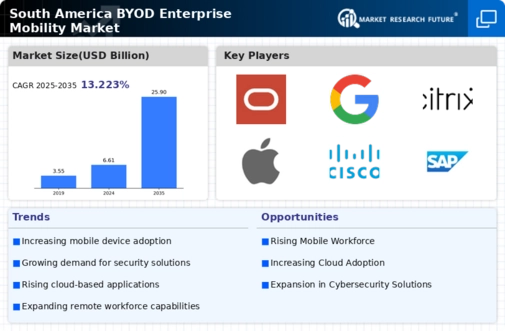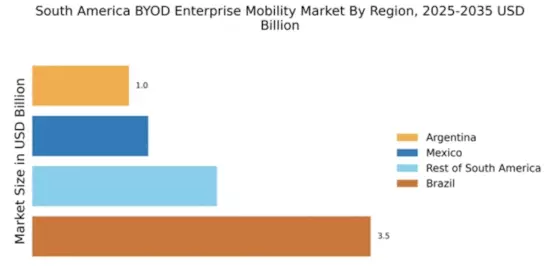Rising Mobile Workforce
The increasing prevalence of remote work in South America is a pivotal driver for the byod enterprise-mobility market. As organizations adapt to flexible work arrangements, employees are utilizing personal devices for professional tasks. This trend is evidenced by a reported 30% rise in mobile workforce participation across various sectors. Companies are recognizing the need to implement robust policies that facilitate secure access to corporate resources from personal devices. The byod enterprise-mobility market is thus experiencing heightened demand for solutions that ensure data security while promoting productivity. Organizations are investing in mobile device management (MDM) systems to streamline operations and safeguard sensitive information. This shift towards a mobile-centric workforce is likely to continue, further propelling the growth of the byod enterprise-mobility market in the region.
Technological Advancements
Rapid technological advancements are significantly shaping the byod enterprise-mobility market in South America. The proliferation of high-speed internet and the availability of advanced mobile devices are enabling seamless connectivity and enhanced user experiences. With the introduction of 5G technology, organizations are likely to experience improved data transfer speeds and reduced latency, which can facilitate more efficient remote work. Furthermore, the integration of artificial intelligence and machine learning into mobile applications is enhancing security measures and user engagement. These innovations are driving the demand for byod solutions that can accommodate the latest technologies. The byod enterprise-mobility market is thus positioned to benefit from these advancements, as companies seek to adopt cutting-edge solutions that align with their operational needs and enhance employee productivity.
Cost Efficiency and Savings
Cost considerations are increasingly influencing the adoption of byod strategies in South America. Organizations are discovering that allowing employees to use their personal devices can lead to substantial savings on hardware and maintenance costs. A study indicates that companies can save up to 40% on IT expenses by implementing a byod policy. This financial incentive is compelling for businesses looking to optimize their budgets while maintaining operational efficiency. The byod enterprise-mobility market is thus witnessing a surge in interest as firms seek to leverage existing employee devices rather than investing in new equipment. Additionally, the reduction in capital expenditure allows organizations to allocate resources to other critical areas, enhancing overall productivity. As cost efficiency remains a priority, the byod enterprise-mobility market is poised for continued expansion.
Enhanced Collaboration Tools
The demand for enhanced collaboration tools is a significant driver of the byod enterprise-mobility market in South America. As organizations strive to improve communication and teamwork among remote employees, the need for effective collaboration solutions has surged. Tools that facilitate real-time communication, file sharing, and project management are becoming essential for maintaining productivity in a distributed work environment. The byod enterprise-mobility market is responding to this need by offering solutions that integrate seamlessly with existing workflows and support various devices. Companies are increasingly adopting platforms that enable employees to collaborate efficiently, regardless of their location. This trend is likely to continue, as organizations recognize the importance of fostering a collaborative culture in a mobile-first world.
Regulatory Compliance Requirements
In South America, regulatory compliance is becoming increasingly stringent, influencing the byod enterprise-mobility market. Organizations are required to adhere to various data protection laws, which necessitate the implementation of secure byod policies. Compliance with regulations such as the General Data Protection Regulation (GDPR) and local data protection laws is essential for businesses to avoid hefty fines and reputational damage. This regulatory landscape is prompting companies to invest in comprehensive security solutions that protect sensitive information accessed via personal devices. The byod enterprise-mobility market is thus experiencing growth as firms prioritize compliance and seek to mitigate risks associated with data breaches. As regulations evolve, the demand for compliant byod solutions is expected to rise, further driving market expansion.

















